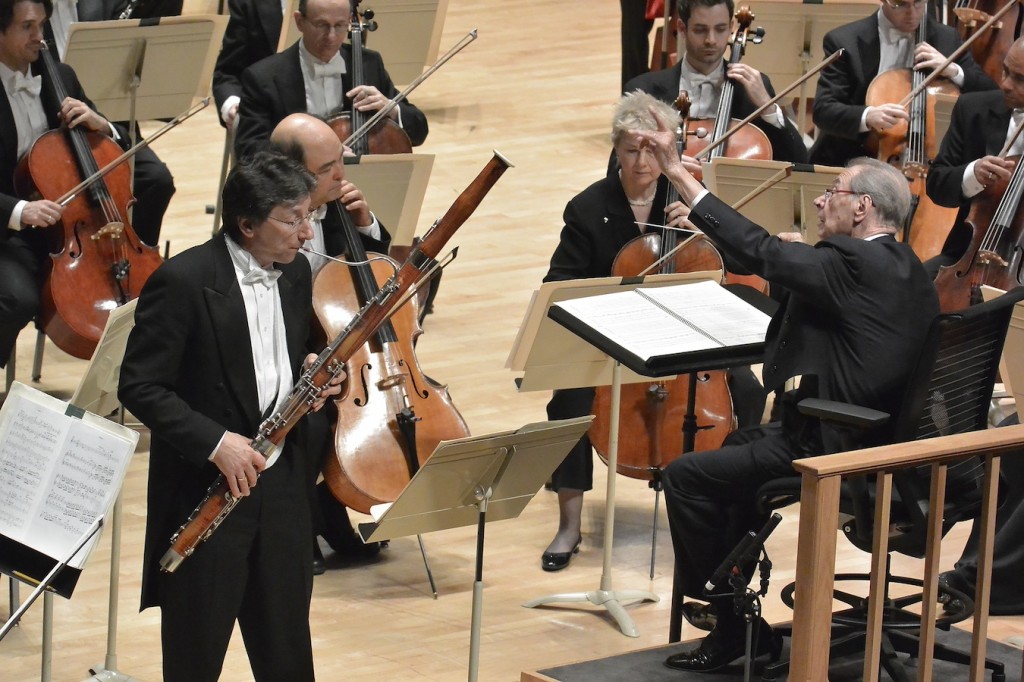Frühbeck de Burgos, BSO offer Neikrug premiere, brilliant Beethoven and de Falla

Richard Svoboda performed Marc Neikrug’s Bassoon Concerto in its world premiere Thursday night with Rafael Frühbeck de Burgos and the BSO. Photo: Stu Rosner
For those who follow the recent fortunes of the Boston Symphony Orchestra, Thursday night’s concert of works by Beethoven, Falla, and Marc Neikrug may have felt like a celebration of recovery.
First there was the conductor Rafael Frühbeck de Burgos, a podium stalwart for the orchestra during these recent music-directorless seasons. Noticeably impaired by illness at subscription concerts last spring, on Thursday night he bounded onstage and took charge of each performance, beaming with satisfaction at the end.
For its part, the BSO, which had appeared disoriented and unable to find its footing in the previous Thursday’s concert, now was humming like a well-tuned race car, and played with a sense of purpose and ensemble that was exceptional even for this storied group.
For these happy reasons, it was the fresh-scrubbed performances of familiar fare—Beethoven’s Sixth Symphony and Falla’s Suites from The Three-Cornered Hat—that overshadowed the evening’s intended newsmaker, the world premiere of Neikrug’s Bassoon Concerto.
Co-commissioned by the BSO and three other orchestras, Thursday’s performance featured the BSO’s long-serving principal bassoonist Richard Svoboda. The audience came prepared to cheer the humble team player on his night in the spotlight, and even had a laugh when he seemed a little abashed to tell the conductor to start the piece.
The musical spotlight, however, seemed a little dim. Svoboda, who has had no difficulty making himself heard in the back of the orchestra in the famous bassoon parts of Berlioz, Tchaikovsky, and Dukas, struggled a bit to project Neikrug’s choppy, burpy lines from the front of the stage.
In printed comments by the composer and program annotator Robert Kirzinger, the bassoon’s role as leader and shaper of the music was emphasized. In the event, however, the large orchestra repeatedly took the bassoon’s themes and spun them into long, loud tutti while the soloist looked on like the nerdy kid who’s had his lunch money stolen.
When the bassoon was finally granted a solo cadenza very late in the piece, it lasted only a few seconds before another orchestral forte ended the proceedings. So, even though Svoboda played energetically in the outer movements and sculpted some melancholy phrases in the middle, and the piece overall was imaginatively composed and orchestrated, the audience responded tepidly at the end, most likely because the local hero didn’t get to shine as much as they hoped.
No such problem with the bright, shiny performance of Beethoven’s “Pastoral” that led off the evening—so fast and perky at the outset, in fact, that it sounded as though Frühbeck, having daringly put a big Beethoven symphony in the program’s “Rossini slot,” was intending to play it like Rossini too.
But if this performance of the first movement ran a few stop signs along the way, there was also virtue in Frühbeck’s straight-up, untweaked, let-Beethoven-be-Beethoven approach, especially with his band sounding so tight and together. And Beethoven’s circling repetitions never seemed more hypnotic, in a Philip Glass kind of way.
The second movement’s “scene at the brook” began fast and somewhat superficially, the string “ripples” almost inaudible, but it gained color and depth as it went along, thanks in part to the delicious interplay of wind solos. Strings gave particular pleasure in the scherzo, from their skipping staccato at the outset to the Boston “big dig” of their bows in the robust middle dance.
The storm scene was raw and, well, electric—not a conventional Rossini storm, but Beethoven’s evocation of the sublime in nature. In keeping with the rest of the performance, there was nothing sentimental about the “grateful feelings” of the finale, which were expressed gracefully but briskly and very “up.” An energized audience called the conductor back to the stage twice, an unusual response to a concert opener.
Following Neikrug’s concerto, Frühbeck closed the program with Manuel de Falla’s two suites from the ballet The Three-Cornered Hat. The orchestra changed hats too, wearing its Spanish Modern as jauntily as its German Romantic and its American Contemporary, the strings more biting than ever in the dances and more lush in suggesting the charms of the Miller’s Wife.
A croaky bassoon as the lovelorn Corregidor joined Beethoven’s rustics and Neikrug’s soloist on a big night for that instrument. In fact, the virtuosity of all the sections, marshaled expertly by the Spanish maestro, turned Falla’s score into a riot of orchestral color.
Pleasures both subtle and blatant awaited in the second suite, beginning with the delicate, perfectly controlled fluctuations of tempo in the Seguidillas—orchestral virtuosity of another sort—and continuing to the emphatic Farruca and the spectacular closing Jota.
Through it all, Rafael Frühbeck de Burgos was large, in charge, and apparently having a ball. One has to wonder how many performances of this familiar piece by his countryman he has led over the decades. No matter—when you get your health back, everything you do feels like the first time. And you remember to do it as if it was the last.
The program will be repeated 8 p.m. Saturday. bso.org; 617-266-1200.
Posted in Performances




